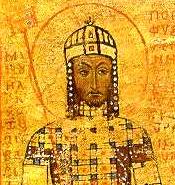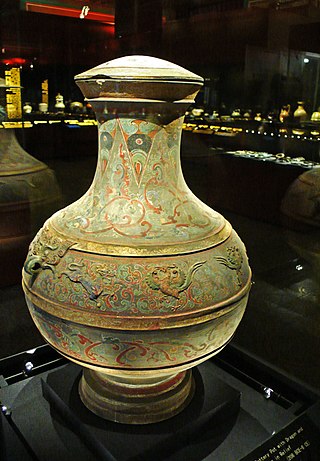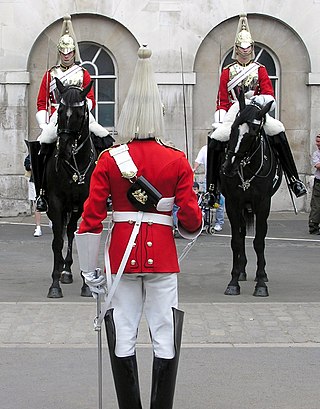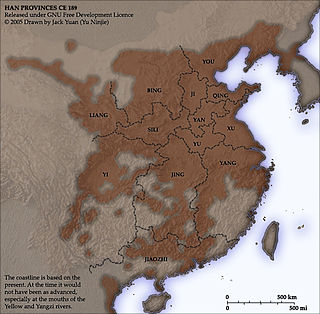
The word emperor can mean the male absolute ruler of an empire. Empress, the female equivalent, may indicate an emperor's wife, mother/grandmother, or a woman who rules in her own right and name. Emperors are generally recognized to be of the highest monarchic honor and rank, surpassing kings. In Europe, the title of Emperor has been used since the Middle Ages, considered in those times equal or almost equal in dignity to that of Pope due to the latter's position as visible head of the Church and spiritual leader of the Catholic part of Western Europe. The emperor of Japan is the only currently reigning monarch whose title is translated into English as "Emperor".

The Praetorian Guard was an elite unit of the Imperial Roman army that served as personal bodyguards and intelligence agents for the Roman emperors.

Immortals or Persian Immortals was the name given by Herodotus to an elite heavy infantry unit of 10,000 soldiers in the army of the Achaemenid Empire. The unit served in a dual capacity through its role as imperial guard alongside its contribution to the ranks of the Persian Empire's standing army. While it primarily consisted of Persians, the Immortals force also included Medes and Elamites. Essential questions regarding the historic unit remain unanswered because authoritative sources are missing.

The Xin dynasty, also known as Xin Mang in Chinese historiography, was a short-lived Chinese imperial dynasty which lasted from 9 to 23 AD, established by the Han dynasty consort kin Wang Mang, who usurped the throne of the Emperor Ping of Han and the infant "crown prince" Liu Ying. The Xin dynasty ruled for over a decade before it was overthrown by rebels. After Wang's death, the Han dynasty was restored by Liu Xiu, a distant descendant of the Emperor Jing of Han; therefore, the Xin dynasty is often considered an interregnum period of the Han dynasty, dividing it into the Western Han and the Eastern Han.

The Varangian Guard was an elite unit of the Byzantine Army from the tenth to the fourteenth century who served as personal bodyguards to the Byzantine emperors. The Varangian Guard was known for being primarily composed of recruits from northern Europe, including mainly Norsemen from Scandinavia but also Anglo-Saxons from England. The recruitment of distant foreigners from outside Byzantium to serve as the emperor's personal guard was pursued as a deliberate policy, as they lacked local political loyalties and could be counted upon to suppress revolts by disloyal Byzantine factions.
Richard Rafe Champion de Crespigny, also known by his Chinese name Zhang Leifu, is an Australian sinologist and historian. He was an adjunct professor in the College of Asia and the Pacific at the Australian National University. He specialised in the history, geography, and literature of the Han dynasty, particularly the translation and historiography of material concerning the Han dynasty and the Three Kingdoms period.

A royal guard is a group of military bodyguards, soldiers or armed retainers responsible for the protection of a royal family member, such as a king or queen, or prince or princess. They often are an elite unit of the regular armed forces, or are designated as such, and may maintain special rights or privileges.

The Battle of Sirmium, Battle of Semlin or Battle of Zemun was fought on July 8, 1167 between the Byzantine Empire, and the Kingdom of Hungary. The Byzantines achieved a decisive victory, forcing the Hungarians to sue for peace on Byzantine terms. The battle consolidated Byzantine control of the western Balkans.
Immortal Guards may refer to:

The Campaign against Dong Zhuo was a punitive expedition initiated by a coalition of regional officials and warlords against the warlord Dong Zhuo in 190 in the late Eastern Han dynasty. The members of the coalition claimed that Dong had the intention of usurping the throne by holding Emperor Xian hostage and by establishing a strong influence in the imperial court. They justified their campaign as to remove Dong from power. The campaign led to the evacuation of the capital Luoyang and the shifting of the imperial court to Chang'an. It was a prelude to the end of the Han dynasty and, subsequently, the Three Kingdoms period.

The Immortals were one of the elite tagmata military units of the Byzantine Empire, first raised during the late 10th century. The name derives from a- ("without") + thanatos ("death").

The Han dynasty was the second imperial dynasty of China, following the Qin dynasty. It was divided into the periods of Western (Former) Han and Eastern (Later) Han, briefly interrupted by the Xin dynasty of Wang Mang. The capital of Western Han was Chang'an, and the capital of Eastern Han was Luoyang. The emperor headed the government, promulgating all written laws, serving as commander-in-chief of the armed forces, and presiding as the chief executive official. He appointed all government officials who earned a salary of 600 bushels of grain or more with the help of advisors who reviewed each nominee. The empress dowager could either be the emperor's actual or symbolic mother, and was in practice more respected than the emperor, as she could override his decisions. The emperor's executive powers could also be practiced by any official upon whom he bestowed the Staff of Authority. These powers included the right to execute criminals without the imperial court's permission.
The Nine Ministers or Nine Chamberlains was the collective name for nine high officials in the imperial government of the Han dynasty, who each headed one of the Nine Courts and were subordinates to the Three Councillors of State.
The Imperial Guards of the Tang dynasty, also known as the Forbidden Troops, were initially honor guards of the emperor and garrisons of the imperial capitals during the Tang's formation in the early 7th century. After the An Shi Rebellion, which lasted from AD 755 to 763, the Imperial Guards became the only military force that remained under direct control of the Tang court.

The Hetaireia was a term for a corps of bodyguards during the Byzantine Empire.

The Numerus Batavorum, also called the cohors Germanorum, Germani corporis custodes, Germani corpore custodes, Imperial German Bodyguard or Germanic bodyguard was a personal, imperial guards unit for the Roman emperors of the Julio-Claudian dynasty composed of Germanic soldiers. Although the Praetorians may be considered the Roman Emperor's main bodyguard, the Germanic bodyguards were a unit of more personal guards recruited from distant parts of the Empire, so they had no political or personal connections with Rome or the provinces.

A life guard is a military unit charged with protecting a high-ranking individual, such as a monarch.

The Battle of Chang'an, also known as the Sack of Chang'an, took place in the western Chinese imperial capital city of Chang'an on 28 June 192, at the end of the Han dynasty, the prelude of the Three Kingdoms.

From 172 to 174, the religious leader Xu Chang led a major uprising against the Han dynasty of China in the Kuaiji Commandery. Having proclaimed himself emperor while restoring the ancient state of Yue, Xu and his followers initially proved successful and overran much of Kuaiji. The Han central government consequently appointed Zhang Min as commander of the local pro-government forces and mobilized soldiers from across Yang Province. In late 174, the insurgents were finally destroyed.
















